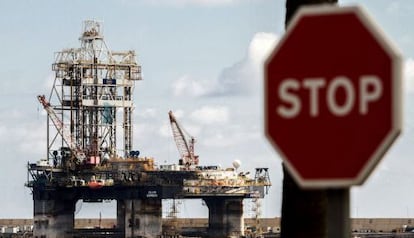Supreme Court rules in favor of oil prospecting off Canary Islands
Tribunal ignored seven appeals claiming damage to island wildlife, fishing and tourism


Oil prospecting may be conducted in the Canary Islands after all. The Supreme Court has rejected seven appeals filed by island authorities, green groups and leftist parties against a 2012 decree authorizing hydrocarbon exploration in the waters off the archipelago.
The project has been clearing hurdles since 2001, when a royal decree granted the oil giant Repsol exploration rights for six years. The Supreme Court canceled the license, however, because it lacked the necessary environmental permissions.
In 2012, the conservative government of the Popular Party decided that Repsol had resolved any existing deficiencies and it issued the exploration license again in a new decree. But the regional government of the Canaries, the local councils of the islands of Lanzarote and Fuerteventura, the green groups WWF and Ecologistas en Acción-Ben Magec, the cultural center César Manrique Foundation and the United Left coalition all filed appeals against the decision.
The appeals noted that both Lanzarote and Fuerteventura are UNESCO Biosphere Reserves and that the exploration could have negative effects on protected whale and turtle species. Detractors of the oil prospecting added that the fishing and tourism-based economies of the islands could be endangered by the project.
But the Supreme Court took into account the fact that the Agriculture and Environment Ministry granted the necessary permits to Repsol in May of this year. The company may now drill three wells up to 5,000 meters deep around 60 kilometers from the coastline.
All that is required now is one last permit from the Industry Ministry, which will authorize the actual on-site work.
Tens of thousands of Canary Island residents marched early this month to protest against the project. The demonstrations were organized by citizen groups after it emerged that the Environment Ministry had given the green light. Government sources talked about 50,000 people, while organizers multiplied attendance by four.
On June 17, representatives from Spain’s five major green groups handed Repsol executives over 200,000 signatures collected in 183 countries against oil exploration near the Canaries.
“This is a very sad day for ocean conservation,” said Juan Carlos del Olmo, secretary general for WWF. “The company’s arrogance has led it to start at the end rather than at the beginning. The project was authorized while lacking all the necessary paperwork. The entire process has been rather irregular.”
His organization has already raised a complaint with the European Commission, on the grounds that Repsol’s plans are in violation of EU directives.
“Now we know that Repsol has someone to defend it, while the environment is defended neither by the relevant ministry nor by the justice system,” says Julio Barea, head of Greenpeace’s anti-exploration campaign. “Unfortunately, accidents have shown us that there is no safe way to extract oil in deep waters, and fishing and tourism in the Canaries are going to pay the consequences of the government’s suicidal policy.”
Tu suscripción se está usando en otro dispositivo
¿Quieres añadir otro usuario a tu suscripción?
Si continúas leyendo en este dispositivo, no se podrá leer en el otro.
FlechaTu suscripción se está usando en otro dispositivo y solo puedes acceder a EL PAÍS desde un dispositivo a la vez.
Si quieres compartir tu cuenta, cambia tu suscripción a la modalidad Premium, así podrás añadir otro usuario. Cada uno accederá con su propia cuenta de email, lo que os permitirá personalizar vuestra experiencia en EL PAÍS.
¿Tienes una suscripción de empresa? Accede aquí para contratar más cuentas.
En el caso de no saber quién está usando tu cuenta, te recomendamos cambiar tu contraseña aquí.
Si decides continuar compartiendo tu cuenta, este mensaje se mostrará en tu dispositivo y en el de la otra persona que está usando tu cuenta de forma indefinida, afectando a tu experiencia de lectura. Puedes consultar aquí los términos y condiciones de la suscripción digital.








































